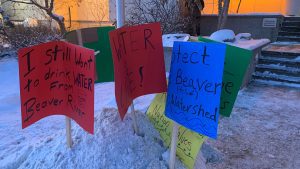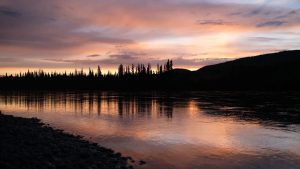A First Nation in Yukon says it’s frustrated the territorial government is appealing a court ruling stopping a mining exploration project from proceeding in an untouched watershed on its lands.
The Beaver River Watershed falls within the traditional territory of the First Nation of Na-Cho Nyäk Dun (FNNND) in north-central Yukon.
The First Nation refers to it as its “breadbasket,” an area that serves as a vital habitat for animals like bears, moose and wolves.
“It was disheartening that Yukon Government brought this appeal at all,” Chief Dawna Hope said in a release. “Our claims were fully vindicated by the Yukon Supreme Court.”
The matter dates back to 2021 when the First Nation launched a judicial review after the Yukon government approved the project to proceed to the next stage.
Proposed by Metallic Minerals, the project would entail exploration activities every summer for ten years in the heart of the watershed, also known as Tsé Tagé.
In January, the territory’s Supreme Court quashed the Yukon government’s approval of the project.
Chief Justice Suzanne Duncan said in her decision the Yukon government failed to properly consult with the First Nation based on its Final Agreements, particularly regarding unfulfilled Treaty promises surrounding land use planning for the watershed – despite arguments from the government stating otherwise.
The decision meant the project, which was in the final assessment stage before the authorization process, was effectively sent back to the evaluation stage.
The First Nation hailed the decision as a “landmark ruling.”
“Chief Justice Duncan of the Yukon Supreme Court listened to our voices, including that of our Elders, heard our concerns, and made a decision that recognized the sacred promises of our Treaty,” Hope said.
The Yukon government has now asked that Duncan’s decision, as well as her declarations, be overturned in the territory’s three member Court of Appeal.
The hearing saw a packed courtroom of the First Nation’s citizens, Elders and environmental advocates.
Supporters also held a small rally outside the courthouse in support of the watershed and the community’s need for land use planning of the area.

“Chief Justice Duncan’s decision provided a clear path forward that we were hoping Yukon Government would walk with us willingly,” Hope said.
“Instead, we found ourselves in court again to defend our lands and our rights.”
Yukon government defends consultation as adequate
Government lawyer I.H. Fraser disputed much of Duncan’s findings and asserted the Yukon government’s approval of the project was lawful.
Regarding the reclamation of the project, Fraser said it’s impossible to restore the natural environment back to its original state. He noted if all projects were judged by this standard, none would ever be allowed to proceed.
“I suggest when you’re looking at any environment at the end of 10 years it’s not going to look exactly like it did at the start of the project, even if the project doesn’t need to be reclaimed. So, the natural environment’s not static,” he said.
Read More:
Yukon government appealing Peel river watershed decision
Yukon Appeal Court rules government failed treaty obligations on Peel River development
Fraser further argued Yukon government’s approval of the project would not have any impact on Chapter 11 of the community’s Final Agreements, which deals with land use planning.
He said as it became obvious the First Nation was not on board with the project, further consultation was no longer necessary – or even required.
Fraser said that’s because the government had carried out adequate consultation as stipulated in the Final Agreements.
“Yukon government’s position is that the approval of this project does not have any impact on Chapter 11, and therefore we do not need to consult on the potential impacts of the Chapter 11 rights,” he said. “We’ve done what we’ve done already.”
Land use planning needed says First Nations
Meanwhile, the community’s lawyer Nuri Frame disagreed with much of Fraser’s arguments.
He said the First Nation has been waiting 30 years for a land use plan – and the situation showcases how there is a lack of urgency from treaty partners to finalize land use plans.
The project, he said, should be deferred until a land use plan is finalized.
He also argued that a lack of consultation on the government’s part “isn’t a new problem.”
He said the Yukon government has an obligation to listen “but not much more,” and that little thought or consideration about its treaty obligations with the First Nation were included in its decision to allow the project to proceed.
“Yukon was in its own words ‘puzzled’ by the First Nation’s desire to talk about these issues, and rather than getting unpuzzled, which I suspect could have happened and should have happened through sitting down and actually talking…consultation has ended,” he said.
Frame added Yukon government’s conduct went against the spirit of how First Nations view consultation, which is problem-solving in a joint manner and forming relationships.
“We’re supposed to be engaged in a dynamic relationship of reconciliation which is ongoing, in good faith and honorable,” he said.

The court also heard from Kate Blomfield, a lawyer for Champagne and Aishihik First Nations (CAFN), which is an intervenor in the case.
She said CAFN’s treaty “parallels” FNNND’s, and that the First Nation likewise doesn’t have a regional land use plan after 30 years.
The longer it takes to sort land use planning issues, she said, the more issues will spring up.
“(CAFN and FNNND) are in a position where 30 years has passed with an establishment of the treaty, and we submit that this must be factored in,” she said. “Timely action needs to be part of the court’s assessment generally of whether the intended purposes of a treaty are being met.”
The court reserved its decision for a later date.
Hope said her people are “optimistic” it will let the decision stand.
“We thank the Court of Appeal for considering our submissions and we look ahead to the day that we can finally implement key promises in our Treaty.”









